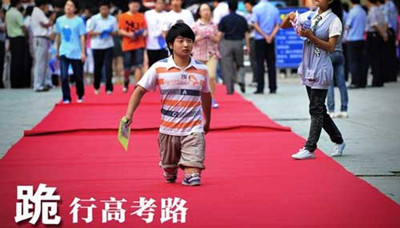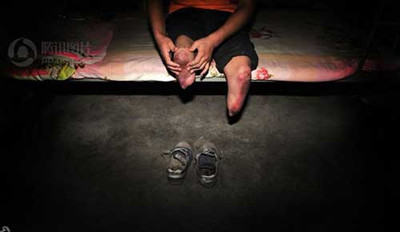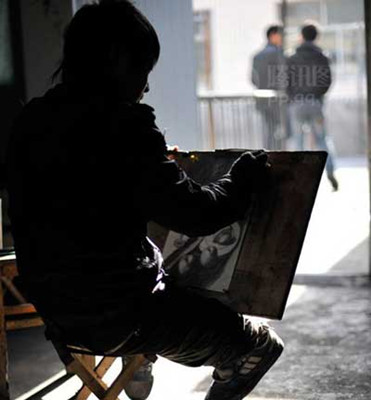(单词翻译:单击)

On June 7, 2011, Li Wei, at a height of only 1.2 meters, walking on his amputated shanks, with his head held high, and "walked" on the red carpet to attend the 2011 national college entrance examination.
2011年6月7日,一个身高只有1.2米的无脚考生踏着红毯,昂首跪行走向高考考场——他的名
字叫李卫。
On June 7, 2011, a thousand students gathered outside the gate of Hanyin Middle School for the national college entrance examination. With the blow of a whistle, the gate opened and students entered the school grounds on a specifically-prepared red carpet.
2011年6月7日,在汉阴中学考点门口聚集了千余名高考生。一声哨响,校门打开,考生陆续踏上学校特意铺设的红地毯。
Among them, Li Wei, a 1.2-meter-tall boy attracted the most attention. He is wearing shoes but actually having no feet. With unimaginable perseverance, Li Wei walked on his knees all the way to the examination room.
在他们当中,一个只有1.2米高的考生引人注目。他叫李卫,穿着鞋子却没有脚,凭着我们难以想象的毅力,跪行走入考场。
Twenty-one years ago, Li Wei was born to a poor rural family in Puxi Township, Hanyin County, Shaanxi Province. His birth brought great happiness to the family. However, their hopes were almost shattered by a brutal accident several years later.
21年前,李卫出生在陕西省汉阴县蒲溪镇一个贫穷的农村家庭,他的降临为家庭带来了欢乐。然而,一切都被几年后的一场车祸无情地打碎了。
On April 2, 1994, three-year-old Li Wei was having fun with friends by the road, when a speeding truck struck him. Caught under the wheel, his legs could not be saved, and were amputated in the hospital. His life has changed since then. Without feet, he had to spend most of his time getting around his hands and knees.
1994年4月2日,3岁的李卫和伙伴在路边玩耍,在毫无征兆的情况下,一辆疾驰的卡车将李卫卷入车轮下。双腿被截肢,他的人生从此拐入另一个轨道。没有了双脚,李卫大部分时间都在地上爬着度过。
At the age of seven, Li Wei was at first refused by primary schools. After repeated efforts of his parents and with the help of the county education bureau, Li Wei finally was admitted to the classroom, only two months after the beginning of a new semester.
到了7岁,没有学校愿意接收李卫。父母不断求助,在县教育局的协调下,李卫终于坐进了教室,只是比别的孩子迟了近两个月。
For the first three years, Li's parents carried him on their back to school. However, one day, they were so busy with farm work that they left him at home. The unyielding 10-year-old insisted on crawling to school. He spent more than one hour making the one-kilometer journey crawling on his hands and knees. After several tries, he began to use his knees as feet and kneel to move.
头三年里,都是父母轮流背着李卫上下学。有一次逢农忙抢收,父母实在没时间接送他,就让他呆在家里。当时10岁的李卫很倔强,硬是从家里爬到了学校,近千米的路途,他爬了一个多小时。这样几趟爬行后,他尝试用膝盖当脚,跪在地上向前走。
Within days, Li's trousers were worn out and both knees were scarred and bleeding. To aide his walking, Li's father outfitted Li's knees with rubber shoes tied around his thighs. From that day on, Li started walking to school every day.
几天下来,裤子磨破了,双膝磨烂了。在父亲的帮助下,李卫找了双胶鞋将膝盖塞进去,用鞋带绑在大腿上。自那之后,李卫开始跪行求学之路。

Li Wei "tortured" his knees for more than ten years, with small wounds building up one after another, to build up to his current ability.
为了练习跪着走路,李卫两个膝盖上的皮不知磨掉了多少层,十多年来小伤口不断。
Striving to stand up on two legs
梦想能真正地站起来
Everybody who sees Li Wei for the first time is surprised to find that he can easily play tennis or climb up stairs without feet. Some people even think he still has his feet, but has short legs.
第一次看到李卫的人都会诧异,一个没有双脚的人,不论是打乒乓球还是上楼梯都很自如,甚至有人怀疑他不是没有脚只是腿短。
According to Li, he "tortured" his knees for more than ten years, with small wounds building up one after another, to build up to his current ability.
李卫描述说,自己为了练习跪着走路,两个膝盖上的皮不知磨掉了多少层,十多年来小伤口不断。
Several years ago, Li Wei's parents paid 2,000 yuan to buy a pair of artificial legs for him. However, due to many years of walking on his knees, Li's two incomplete shanks were already too stiff to extend. It ached a lot when he tried to walk with the artificial legs. Nonetheless, Li was overjoyed. "It is wonderful that I can finally stand up on my feet," Li said. "With the artificial legs, I am even taller than my mother."
几年前,李卫的父母花了两千块钱为他订做了一对假肢。由于长时间跪地行走,李卫两个残缺的小腿已经僵硬,很难伸直。装上假肢后,他尝试着行走,但疼痛难忍。不过,李卫很开心。站起来的感觉真好,装上假肢后,我比妈妈还要高。他说。
In senior high school, Li Wei became interested in painting and began to study it. He now sees painting as a potential career path. He said that although a career in art is highly ambitious for the son of a poor family, he would make every effort to realize the dream.
上高中后,李卫对画画产生了兴趣,开始学习画画。现在,他把画画当成了将来职业选择的方向,他说美术虽然是贫穷学生的奢侈梦想,但他愿意为之努力。
Failing to get high enough marks in 2010 national college entrance examination, Li Wei decided to continue his high school study until he gets accepted by a university.
去年高考,李卫因为分数不够而落榜,他毅然决定复读,直到实现自己的大学梦。

In senior high school, Li Wei became interested in painting and began to study it.
上高中后,李卫对画画产生了兴趣,开始学习画画。
Prior to taking the 2011 exam, Li sang proudly with the other students the words of the popular song "My Future is Not a Dream."
今年参加高考之前,李卫曾和同学大声唱着一首歌《我的未来不是梦》。
"I know my future is not a dream," the song begins, "I will live happily for every minute of my life. My future is not a dream, my heart throbs with the hope ..."
歌词这样写道:我知道我的未来不是梦,我认真地过每一分钟,我的未来不是梦,我的心跟着希望在动……
After Li Wei's photo of kneeling on the red carpet outside the examination room for the national college entrance exam was posted on the web this June, Li's tale of perseverance has been widely reported across the country.
今年6月,李卫跪在红地毯上步入高考考场的照片在网络上传开后,李卫顽强的意志被媒体传播开来。
The reports caught the attention of Zhang Haidi, chairwoman of China Disabled Persons' Federation. With her help, Li received a new pair of artificial legs and also received complementary rehabilitation training this summer.
这些报道引起了中国残联主席张海迪的注意。在她的帮助下,李卫安装了一副新的假肢,并在今年夏天接受了康复训练。
Netizens nicknamed him "Strong Brother". "I'm a very normal person," Li insists.
他被网友称为坚强哥,但他却说:我就是正常人。
Now, standing up at a height of 1.71 meters, Li Wei has been enjoying his campus life at Chongqing Normal University.
目前,站起来有1.71米个头的李卫,正在重庆师范大学享受着他的校园生活。


